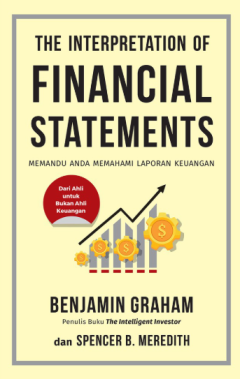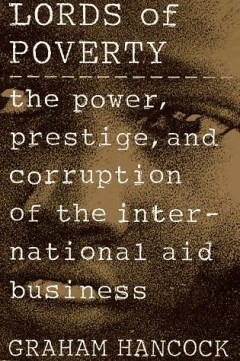Ditapis dengan

The Interpretation of Financial Statements : Memandu Anda Memahami Laporan Ke…
- Edisi
- Cetakan 6
- ISBN/ISSN
- 9786026486349
- Deskripsi Fisik
- ix, 166 hlm.; 23 cm
- Judul Seri
- -
- No. Panggil
- 658.159 BEN t
- Edisi
- Cetakan 6
- ISBN/ISSN
- 9786026486349
- Deskripsi Fisik
- ix, 166 hlm.; 23 cm
- Judul Seri
- -
- No. Panggil
- 658.159 BEN t

Animal and BIrds in Australia
- Edisi
- Cetakan 1
- ISBN/ISSN
- -
- Deskripsi Fisik
- 170 hlm.: ilus.; 33 cm
- Judul Seri
- -
- No. Panggil
- R 570.2594 GRA a
- Edisi
- Cetakan 1
- ISBN/ISSN
- -
- Deskripsi Fisik
- 170 hlm.: ilus.; 33 cm
- Judul Seri
- -
- No. Panggil
- R 570.2594 GRA a

Lords of poverty : the power, prestige, and corruption of the international a…
Lords of Poverty is a case study in betrayals of a public trust. The shortcomings of aid are numerous, and serious enough to raise questions about the viability of the practice at its most fundamental levels. Hancocks report is thorough, deeply shocking, and certain to cause critical reevaluation of the governments motives in giving foreign aid, and of the true needs of our intended beneficiaries.
- Edisi
- -
- ISBN/ISSN
- 9.78E+12
- Deskripsi Fisik
- xvi, 234 p. ; 22 cm.
- Judul Seri
- -
- No. Panggil
- 338.9 Han l

Lords of poverty : the power, prestige, and corruption of the international a…
Lords of Poverty is a case study in betrayals of a public trust. The shortcomings of aid are numerous, and serious enough to raise questions about the viability of the practice at its most fundamental levels. Hancocks report is thorough, deeply shocking, and certain to cause critical reevaluation of the governments motives in giving foreign aid, and of the true needs of our intended beneficiaries.
- Edisi
- -
- ISBN/ISSN
- 9780871134691
- Deskripsi Fisik
- xvi, 234 p. ; 22 cm.
- Judul Seri
- -
- No. Panggil
- 338.9 Han l

Lords of poverty : the power, prestige, and corruption of the international a…
Lords of Poverty is a case study in betrayals of a public trust. The shortcomings of aid are numerous, and serious enough to raise questions about the viability of the practice at its most fundamental levels. Hancocks report is thorough, deeply shocking, and certain to cause critical reevaluation of the governments motives in giving foreign aid, and of the true needs of our intended beneficiaries.
- Edisi
- -
- ISBN/ISSN
- 9780871134691
- Deskripsi Fisik
- xvi, 234 p. ; 22 cm.
- Judul Seri
- -
- No. Panggil
- 338.9 Han l

Lords of poverty : the power, prestige, and corruption of the international a…
Lords of Poverty is a case study in betrayals of a public trust. The shortcomings of aid are numerous, and serious enough to raise questions about the viability of the practice at its most fundamental levels. Hancocks report is thorough, deeply shocking, and certain to cause critical reevaluation of the governments motives in giving foreign aid, and of the true needs of our intended beneficiaries.
- Edisi
- -
- ISBN/ISSN
- 9.78E+12
- Deskripsi Fisik
- xvi, 234 p. ; 22 cm.
- Judul Seri
- -
- No. Panggil
- 338.9 Han l

Lords of poverty : the power, prestige, and corruption of the international a…
Lords of Poverty is a case study in betrayals of a public trust. The shortcomings of aid are numerous, and serious enough to raise questions about the viability of the practice at its most fundamental levels. Hancocks report is thorough, deeply shocking, and certain to cause critical reevaluation of the governments motives in giving foreign aid, and of the true needs of our intended beneficiaries.
- Edisi
- -
- ISBN/ISSN
- 9780871134691
- Deskripsi Fisik
- xvi, 234 p. ; 22 cm.
- Judul Seri
- -
- No. Panggil
- 338.9 Han l
 Karya Umum
Karya Umum  Filsafat
Filsafat  Agama
Agama  Ilmu-ilmu Sosial
Ilmu-ilmu Sosial  Bahasa
Bahasa  Ilmu-ilmu Murni
Ilmu-ilmu Murni  Ilmu-ilmu Terapan
Ilmu-ilmu Terapan  Kesenian, Hiburan, dan Olahraga
Kesenian, Hiburan, dan Olahraga  Kesusastraan
Kesusastraan  Geografi dan Sejarah
Geografi dan Sejarah